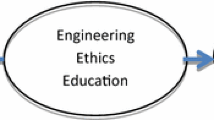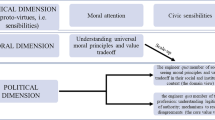Abstract
In this paper we present the authors’ experience of teaching a course in Ethics for Engineers, which has been delivered four times in three different universities in Spain and Chile. We begin by presenting the material context of the course (its place within the university program, the number of students attending, its duration, etc.), and especially the intellectual background of the participating students, in terms of their previous understanding of philosophy in general, and of ethics in particular. Next we set out the objectives of the course and the main topics addressed, as well as the methodology and teaching resources employed to have students achieve a genuine philosophical reflection on the ethical aspects of the profession, starting from their own mindset as engineers. Finally we offer some results based on opinion surveys of the students, as well as a more personal assessment by the authors, recapitulating the most significant achievements of the course and indicating its underlying Socratic structure.
Similar content being viewed by others
Notes
Plato, Gorgias 458a, Socrates says: “Of what sort am I? One of those who would be glad to be refuted if I say anything untrue, and glad to refute anyone else who might speak untruly; but just as glad, mind you, to be refuted as to refute”. Translation by (Lamb 1924).
References
ACM/IEEE. (1999). Software engineering code of ethics and professional practice, v5.2. Association for Computing Machinery/Institute of Electrical and Electronics Engineers. http://www.acm.org/about/se-code/.
Bergmann, J., & Sams, A. (2012). Flip your classroom: Reach every student in every class every day. Washington, DC: International Society for Technology in Education.
Berne, R. W., & Schummer, J. (2005). Teaching societal and ethical implications of nanotechnology to engineering students through science fiction. Bulletin of Science, Technology & Society, 25(6), 459–468.
Billington, D. P. (2006). Teaching ethics in engineering education through historical analysis. Science and Engineering Ethics, 12(2), 205–222.
Bouville, M. (2008). On using ethical theories to teach engineering ethics. Science and Engineering Ethics, 14(1), 111–120.
Chang, R. (2002). The possibility of parity. Ethics, 112(4), 659–688.
Davis, M. (1997). Developing and using cases to teach practical ethics. Teaching Philosophy, 20(4), 353–385.
Dewey, J. (1922). Human nature and conduct. New York: Prometheus Books.
Dewey, J. (1938). Experience and education. New York: MacMillan.
Génova, G., González, M. R., & Fraga, A. (2007). Ethical education in software engineering: Responsibility in the production of complex systems. Science and Engineering Ethics, 13(4), 505–522.
Gotterbarn, D., Miller, K., & Rogerson, S. (1999). Software engineering code of ethics is approved. Communications of the ACM, 42(10), 102–107.
Han, H., & Jeong, C. (2014). improving epistemological beliefs and moral judgment through an STS-based science ethics education program. Science and Engineering Ethics, 20(1), 197–220.
Herkert, J. R. (2002). Continuing and emerging issues in engineering ethics education. The Bridge, 32(3), 8–13.
Hoffmann, M., & Borenstein, J. (2014). Understanding Ill-structured engineering ethics problems through a collaborative learning and argument visualization approach. Science and Engineering Ethics, 20(1), 261–276.
Lamb, W. R. M. (1924). Loeb Classical Library edition of Plato in twelve volumes, Vol. 3 (W. R. M. Lamb, trans.). Cambridge, MA: Harvard University Press.
Libet, B. (1999). Do we have free will? Journal of Consciousness Studies, 6(8–9), 47–57.
Lloyd, P., & van de Poel, I. (2008). Designing games to teach ethics. Science and Engineering Ethics, 14(3), 433–447.
MacIntyre, A. (1981). After virtue. Notre Dame: University of Notre Dame Press.
Prensky, M. (2001). Digital natives, digital immigrants. On the Horizon, 9(5), 1–6.
Quintanilla, I. (2012). Techné: la filosofía y el sentido de la técnica. Common Ground España, 2012.
Schmidt, J. A. (2014). Changing the paradigm for engineering ethics. Science and Engineering Ethics, 20(4), 985–1010.
Schumacher, E. F. (1973). The greatest resource—Education. In Small Is (Ed.), Beautiful: A study of economics as if people mattered. London: Blond & Briggs.
Smith, J., Gardoni, P., & Murphy, C. (2014). The responsibilities of engineers. Science and Engineering Ethics, 20(2), 519–538.
Spaemann, R. (1982). Moralische Grundbegriffe. München: Beck Verlag. (Basic Moral Concepts. London: Routledge).
Sunderland, M. E. (2014). Taking emotion seriously: Meeting students where they are. Science and Engineering Ethics, 20(1), 183–195.
Turing, A. M. (1950). Computing machinery and intelligence. Mind, 59, 433–460.
Verharen, C., Tharakan, J., Middendorf, G., Castro-Sitiriche, M., & Kadoda, G. (2013). Introducing survival ethics into engineering education and practice. Science and Engineering Ethics, 19(2), 599–623.
Vlastos, G. (1983). The Socratic elenchus. Oxford Studies in Ancient Philosophy, 1, 27–58.
Voss, G. (2013). Gaming, texting, learning? Teaching engineering ethics through students’ lived experiences with technology. Science and Engineering Ethics, 19(3), 1375–1393.
Whitbeck, C. (1995). Teaching ethics to scientists and engineers: Moral agents and moral problems. Science and Engineering Ethics, 1(3), 299–308.
Wickson, F., Strand, R., & Kjølberg, K. L. (2015). The walkshop approach to science and technology ethics. Science and Engineering Ethics, 21(1), 241–264.
Acknowledgments
This work is part of the research developed within Project FFI2012-37670, “Fundamentos filosóficos de la idea de solidaridad: amor, amistad y generosidad” (philosophical foundations of the idea of solidarity: love, friendship and generosity), supported by the Spanish Ministerio de Economía y Competitividad.
Author information
Authors and Affiliations
Corresponding author
Rights and permissions
About this article
Cite this article
Génova, G., González, M.R. Teaching Ethics to Engineers: A Socratic Experience. Sci Eng Ethics 22, 567–580 (2016). https://doi.org/10.1007/s11948-015-9661-1
Received:
Accepted:
Published:
Issue Date:
DOI: https://doi.org/10.1007/s11948-015-9661-1




